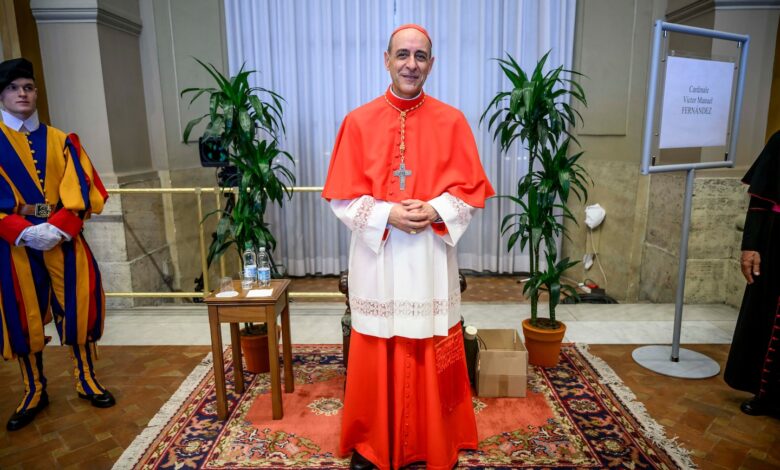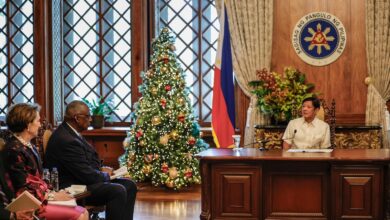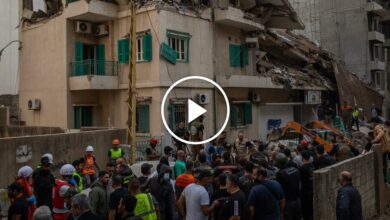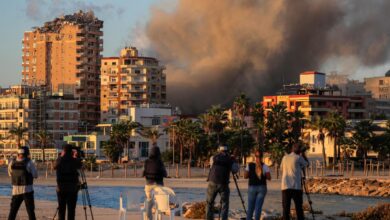Liberal Archbishop Víctor Manuel Fernández is pope’s right-hand man

“I knew that there were groups that did not love me, some willing to do anything — judging by the expressions they used on social networks and even in messages they wrote on my Facebook page — and I was afraid of causing problems for Francis,” Fernández said in an interview with The Washington Post.
When the pope called again last June, from a hospital where he’d just undergone intestinal surgery, Fernández relented. He moved to Vatican City, was named a cardinal and became the pope’s right-hand man, helping to translate the changes in tone and style Francis brought to the papacy into concrete new guidelines for 1.4 billion Catholics.
“Fernández’s appointment was the most consequential of [Francis’s] pontificate,” said Massimo Faggioli, a Catholic theologian at Villanova University. “After one year of Fernández, we’ve witnessed a series … of frequent, specific, out-of-the-ordinary actions have never been observed. And this from a prefect who knows full well that he’s Francis’s own alter ego and enjoys the pope’s complete trust.”
GET CAUGHT UP
Stories to keep you informed
Most Catholics have little sense of the man behind the Vatican’s recent major pronouncements, including blessings for people in same-sex relationships. But the church conservatives opposed to Francis see Fernández as Enemy No. 2. Within the walls of Vatican City, the machinations against the 61-year old cardinal have risen to the level of high palace intrigue, complete with photos snapped surreptitiously in the night and private threats to “destroy” him.
A new era for an old office
Fernández’s arrival marked the end of an era of conservative leadership in the Vatican department known as the Dicastery of the Doctrine of the Faith. The office is most famous for the tribunals of the Roman Inquisition in the 16th century. In more recent decades, it has managed — critics say mismanaged — cases of clerical abuse; reinforced the “immorality” of premarital sex, abortion and euthanasia; and disciplined bishops, priests and nuns for not toeing the Vatican line.
Through Fernández, Pope Francis set out to reinvent the office.
“The dicastery that you will preside over in other epochs came to use immoral methods,” he wrote in a letter to Fernández in July. “Those were times when more than promoting theological knowledge they chased after possible doctrinal errors. What I expect from you is something without doubt much different.”
Like Francis, Fernández — known widely by his nickname “Tucho” — has ushered in a change in tone. In news conferences, his extended digressions and elaborate anecdotes can feel like falling “into a short story by Borges,” a writer for the Catholic Herald assessed. In one session, he uttered a mild profanity. “Tucho, the cardinal prefect with a sinful penchant for swear words,” a scandalized Italian news outlet declared.
Fernández is also responsible for changes of substance. With Francis’s consent, he penned the major document in December that authorized Catholic priests to bless people in same-sex relationships — just two and half years after his more conservative predecessor had rejected the notion out of hand. Fernández issued a decree explicitly allowing transgender godparents and baptisms of transgender people.
Last month, he released a new ruling that took some of the magic out of the Catholic church, removing a bishop’s right to declare unexplained phenomena — such as claimed apparitions of the Virgin Mary — as “supernatural” events. And last week his office took its most decisive action yet against the pope’s critics, launching a trial of Archbishop Carlo Maria Viganò on charges of fomenting schism and denying the pope’s legitimacy.
Senior church critics insist it is no coincidence that Francis waited to place Fernández in the rulemaking post until after the death of Benedict XVI, the traditionalist pope emeritus.
“I think Pope Francis felt himself now freer to realize his ideas,” said Cardinal Gerhard Ludwig Müller, an ally of Benedict who ran the dicastery from 2012 to 2017. “And therefore, he asked [Cardinal] Fernández to come [to] his side, and to promote this program, this agenda.”
Not all of Fernández’s work has come off as “liberal.” LGBTQ+ activists were taken aback in April when he unveiled a document, also signed by the pope, that said “sex-change intervention” threatened “human dignity.” Fernández told The Post that a version drafted before his arrival had focused more heavily on gender identity, and part of his contribution had been to bring its contents in line with the pope’s broadly inclusive message toward migrants, the poor and others. The final document, he noted, also explicitly denounced persecution based on sexual orientation.
The mission of inclusion led by Francis and Fernández took a hit as a result of the pope’s repeated use of a slur in closed-door discussions about upholding the ban on openly gay men studying for the priesthood.
“Certainly it has done damage to the relationship that was created with the LGBTQ+ community,” Faggioli said.
Fernández argued that in clerical circles, the word the pope used — “frociaggine,” or “faggotness” — is not “a synonym for homosexuality” but refers to “some groups in seminaries and in priestly environments that lobby in search of power” and “see all heterosexuals as potential enemies.”
“It is true that it would be advisable to find another word to express that reality, because it can seem homophobic,” Fernández said. “But I have seen gays themselves use similar expressions.”
He also left open the door to a recasting of official church teaching — or catechism — that states homosexual acts are “intrinsically disordered.”
“All subjects can be refined,” he said. “And the language we use can always be much better. In this way there is a chance of greater clarity.”
The changes brought about by Fernández and the pope have deepened rifts within the church. The ruling on same-sex blessings prompted a rebellion by Catholic bishops and cardinals in Africa, Eastern Europe and Central Asia. There was grumbling inside the Vatican, too.
Fernández declined to comment on specific threats and intrigues. But in January, he told the Italian outlet La Stampa that “three times I received threats [saying], ‘we shall destroy you.’”
In one previously undisclosed incident, Fernández went to the pope over concerns he was being surveilled, according to a person familiar with the events who spoke on the condition of anonymity to discuss confidential Vatican matters.
Those concerns were based on a photograph published in November by a conservative Spanish-language Catholic blog. In that nighttime photo, which accompanied an article critical of Fernández, he is seen talking on the phone at a distance through a window of his home on restricted Vatican grounds. The photo identifies the location of his private quarters, and Fernández took that as both an invasion of privacy and a veiled threat, the person said.
Opponents have additionally unearthed and circulated two esoteric tomes — “Heal Me with Your Mouth: The Art of Kissing” and “Mystical Passion: Spirituality and Sensuality” — that Fernández wrote in the 1990s, and in which he mused in detail on the spiritual aspects of sexual orgasms and recounted a sensual encounter with Jesus as imagined by a 16-year-old girl.
Decrying them as “scandalous books of an erotic nature which border on pornography,” one arch-conservative Catholic group — the John Paul II Academy for Human Life and Family — has demanded Fernández’s resignation.
In retrospect, Fernández said, the books reflected less maturity than he would have liked, but he maintained the topics should not be off-limits in spiritual discourse: “I don’t have any shame of the subjects,” he said. “If I had to write them today, they would be richer and more complete.”
A long history with Francis
The campaign against Fernández, and by default, against the pope, has also revived old claims that the Argentine cardinal long served as Francis’s secret “ghost writer” on important papal documents. In his office just south of the colonnades of St. Peter’s Square, Fernández declined to discuss the topic. But there is no question that he is a longtime friend of Francis.
In 2007, Francis — then Cardinal Jorge Bergoglio of Buenos Aires — invited Fernández to a major Latin American Episcopal conference and ended up having him work on the gathering’s concluding document. They sat together on the flight home and engaged in deep conversation, Fernández said.
“We all know that the pope is a very austere man in his personal life,” said Alberto Bochatey, an auxiliary bishop in Fernández’s former diocese of La Plata, Argentina. “In Buenos Aires, he cooked for himself, washed his dishes and had a Tupperware with his vegetables. In that sense, [Fernández] is very similar, and there may have been a human as well as a theological affinity.”
In 2009, the future pope asked Fernández to be rector of the Pontifical Catholic University of Argentina. Fernández has publicly recounted how his detractors sought to undermine him by resurfacing magazine pieces he’d written. In one, he tried to explain the church’s stance against same-sex marriage while offering no moral condemnation.
After his local critics sent those pieces to the Vatican, the dicastery opened a file on him, Fernández has said. He felt as if he were wandering “among the wolves,” he recalled to reporters in April. But Francis had inspired him to stay and fight.
That seems to his approach now, too.
Fernández has been criticized as a choice for his role by survivors of clerical abuse, who point to instances in Argentina where he allegedly sought to protect accused priests. Fernández has admitted to mistakes, and in a Facebook post last year, said his initial reluctance to accept the Vatican job was also based on the fact that he “felt unqualified” to manage the sensitive cases of clerical abuse within the dicastery. The pope was so bent on hiring Fernández, however, that he navigated that issue by ring-fencing the dicastery’s work on abuse cases under autonomous investigators.
More than anything, Fernández has emerged as the pope’s chief defender, repeatedly reminding the pontiff’s Catholic critics of their obligation to papal fealty.
“Religious assent of mind and will must be shown,” Fernández said during one news conference in which he read aloud from a page of canon law.
No, he told senior church figures who were in revolt, the pope’s pronouncement on blessings for same-sex couples was not “heretical” or “blasphemous.”
He has expressed an understanding of cultural differences on gender and sexuality in various countries but pushed back against critics of Francis’s LGBTQ+ outreach.
“What they want [the church] to say is that homosexuals are going to hell, they have to convert, if they don’t, they can’t come to church less have a blessing. This is what they want,” Fernández said.
David Feliba in Buenos Aires contributed to this report.






